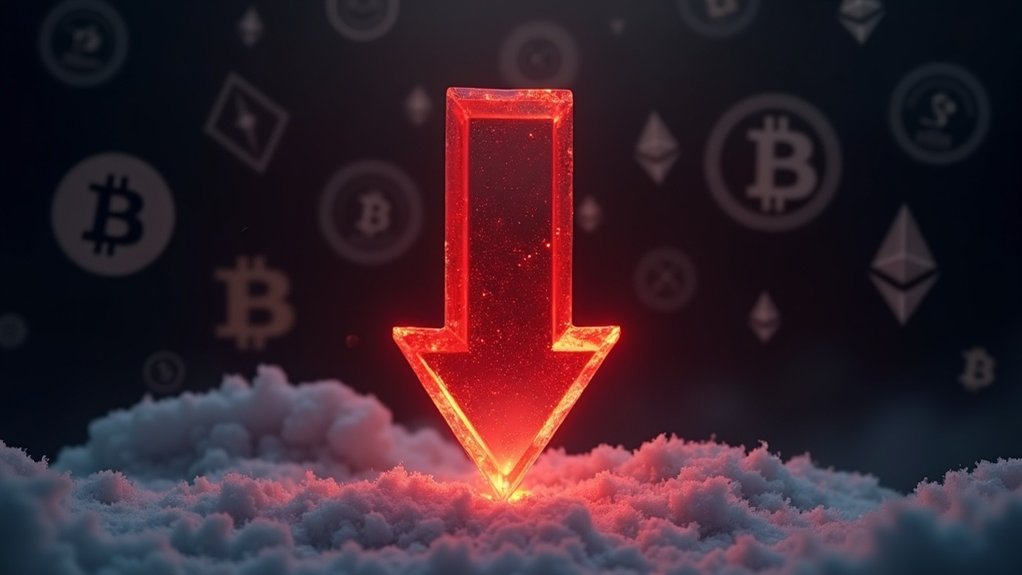Cloud mining lets people mine cryptocurrency without buying expensive hardware. Users simply rent computing power from remote facilities that handle all the technical stuff. It’s appealing because there’s no need to worry about electricity bills or equipment maintenance—just pay the provider and collect rewards. Most operations are total scams though, with 99.999% functioning as elaborate Ponzi schemes. Even legitimate services rarely deliver profits after fees. The crypto mining world isn’t exactly known for its honesty.
How exactly can someone mine cryptocurrency without ever touching a pickaxe, or more relevantly, a computer server?
Enter cloud mining.
It’s a setup where regular folks rent computing power from third-party providers to mine cryptocurrencies like Bitcoin and Dogecoin.
No hardware, no headaches.
The concept is brilliantly simple.
Cloud mining strips away complexity—you pay, they mine, you profit. No technical knowledge required.
You pay someone else who already has massive mining facilities to do the dirty work.
They handle the noisy machines, skyrocketing electricity bills, and technical nightmares.
You just collect your share of the rewards based on how much computing power—or “hash rate”—you’ve rented.
Pretty convenient, right?
Cloud mining works by connecting users to remote data centers filled with specialized mining equipment (ASICs or GPUs).
These facilities are typically located where electricity is dirt cheap.
Users sign contracts specifying how much hash power they’re renting, for how long, and what fees they’ll pay.
The mining company does everything else.
The appeal is obvious.
No need to drop thousands on equipment that becomes outdated faster than last season’s smartphone.
No dealing with overheating computers or explaining to your roommates why the electricity bill suddenly tripled.
No technical expertise required.
Just an internet connection and some cash to invest.
Different models exist in the cloud mining world.
Some offer straight leasing of hash power.
Others let you buy physical machines that they host and maintain.
Some even promise to mine multiple cryptocurrencies simultaneously for better returns.
Contract lengths vary wildly—days, weeks, months, or years.
The Proof-of-Work mechanism ensures miners validate transactions by solving complex cryptographic puzzles to earn rewards.
Many users opt for peer-to-peer cloud mining as it allows direct rental of hashing power from other miners with greater transparency.
But it’s not all digital rainbows and blockchain butterflies.
The industry is plagued with scams.
Many “cloud mining” operations are elaborate Ponzi schemes.
Unfortunately, statistics suggest that 99.999% of companies in this space operate fraudulently, taking users’ money without delivering promised returns.
Even legitimate services often struggle to provide profitable returns after factoring in their fees and the ever-increasing mining difficulty.
Cryptocurrency price volatility doesn’t help either.
For many, though, it remains the only accessible entry point into cryptocurrency mining.
No hardware hassle, no technical barriers—just mining from your couch.
Frequently Asked Questions
Is Cloud Mining Legal in All Countries?
No, cloud mining isn’t legal everywhere.
While most countries permit it under certain conditions, some have slammed the door shut completely.
China? Total ban.
The U.S. and UK? Generally allowed, but with state-level variations and tax obligations.
Georgia offers tax breaks, making it a mining hotspot.
Bottom line: legality depends on local regulations.
Platforms must navigate a maze of financial policies, anti-money laundering rules, and environmental concerns to stay legitimate.
Always changing, too.
What Happens to My Contract if Bitcoin Prices Crash?
If Bitcoin prices crash, your cloud mining contract becomes a lot less profitable.
Simple math.
You’ll still get your BTC payouts, but they’re worth less.
Those fixed service fees? They keep coming, eating into diminishing returns.
Some contracts might even become underwater – costing more than they produce.
Providers don’t offer bailouts or refunds when markets tank.
That’s the gamble with non-refundable contracts.
The crypto world isn’t known for safety nets.
Can I Withdraw My Earnings Anytime?
Most cloud mining platforms allow users to withdraw earnings once minimum thresholds are met.
Each company has different policies though.
Some offer daily settlements with immediate access, while others impose waiting periods or withdrawal limits.
Transaction fees often apply.
Platform reliability matters too – sketchy operations might delay or block withdrawals altogether.
Always check the fine print.
Withdrawals typically go through after passing verification checks, assuming the platform isn’t a scam.
Are There Tax Implications for Cloud Mining Profits?
Yes, tax implications exist for cloud mining profits.
US taxpayers must report cryptocurrency income at fair market value when received – no exceptions.
Regular income tax rates apply (up to 37%).
Business miners report on Schedule C and can deduct expenses; hobby miners use Schedule 1 with no deductions.
Selling mined crypto later? That’s another tax event with capital gains implications.
The IRS isn’t joking around with crypto these days. Keep meticulous records.
How Do I Verify a Cloud Mining Company’s Legitimacy?
To verify a cloud mining company’s legitimacy, investors should demand operational transparency through facility photos, videos, or live feeds.
Legitimate operators won’t dodge basic questions.
Check legal registration and regulatory compliance—actual companies have paperwork.
Research their reputation and history; overnight sensations are suspicious.
Red flags include guaranteed returns and pressure tactics.
The crypto space is crawling with scammers.
No visible mining rigs? Probably no actual mining happening.









